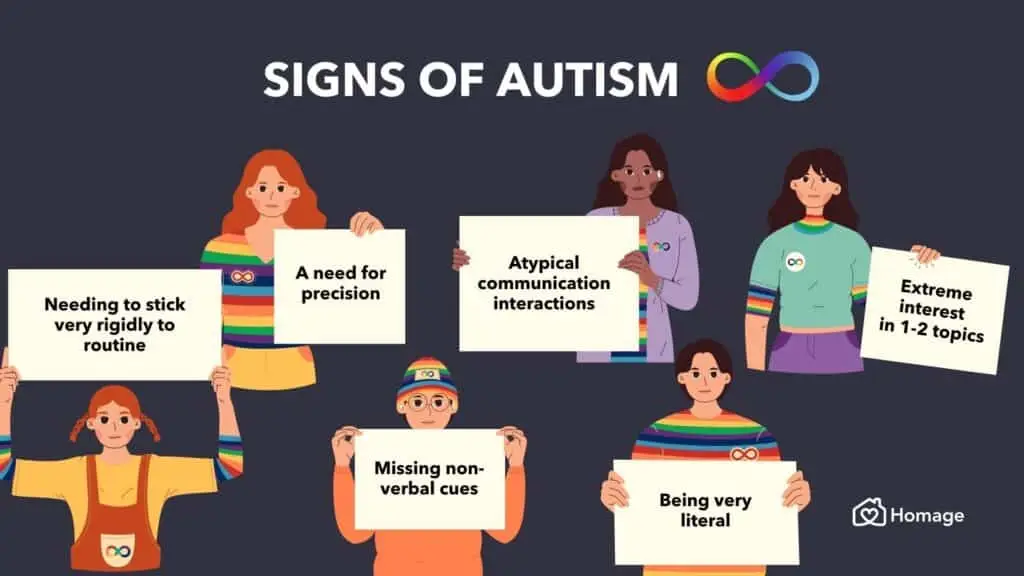This article is dedicated to shedding light on the hidden signs of autism in adults, fostering understanding, and promoting acceptance. We’ll delve into the unique challenges and strengths that autistic adults experience, offering insights into communication styles, social interactions, sensory sensitivities, and more. By unraveling the complexities of autism in adulthood, we hope to empower individuals, families, and communities to create a more inclusive and supportive world for all.
Here are some of the hidden signs of Autism in adults.
1. Difficulty with Social Interactions
Struggles with Social Norms
Many adults with autism find it challenging to understand and follow social norms. This can include difficulty maintaining eye contact, understanding personal space, or interpreting body language. These social cues are often intuitive for neurotypical individuals but can be confusing for those with autism.
Preference for Solitude
Adults on the autism spectrum might prefer spending time alone rather than engaging in social activities. Social situations can be overwhelming, leading to a preference for solitude where they can feel more comfortable and less anxious.
2. Communication Challenges
Literal Interpretation of Language
Adults with autism often interpret language very literally. Idioms, jokes, and sarcasm can be confusing and misunderstood. This literal interpretation can make everyday conversations challenging.
Difficulty Expressing Emotions
Expressing emotions can be another significant challenge. Adults with autism might struggle to convey their feelings or might express them in ways that seem inappropriate or exaggerated to others.
3. Repetitive Behaviors
Routine and Rituals
Repetitive behaviors are a hallmark of autism. Many adults on the spectrum rely on routines and rituals to navigate daily life. Changes in routine can be highly distressing and can lead to significant anxiety.
Fixations and Special Interests
Adults with autism often have intense interests or fixations on specific topics. These special interests can be a source of comfort and joy but can also dominate their time and attention, sometimes to the detriment of other responsibilities.
4. Sensory Sensitivities
Overwhelmed by Sensory Input
Sensory sensitivities are common in adults with autism. They may be overwhelmed by loud noises, bright lights, or strong smells. This heightened sensitivity can make certain environments or situations unbearable.
Preference for Certain Textures
Touch and texture preferences are also prevalent. Adults on the spectrum might have specific clothing preferences due to how certain fabrics feel against their skin or might avoid certain foods because of their texture.
5. Difficulty with Change
Resistance to Change
Change can be particularly challenging for adults with autism. They might have a strong preference for routine and predictability. Unexpected changes can lead to significant stress and anxiety.
Need for Predictability
To manage this, adults with autism often create detailed plans and schedules. The need for predictability helps them feel more in control and reduces the anxiety associated with uncertainty.
6. Executive Functioning Challenges
Trouble with Organization
Executive functioning skills, such as organization, planning, and time management, can be particularly challenging. Adults with autism might struggle to keep track of tasks, manage their time effectively, or plan ahead.
Difficulty Prioritizing Tasks
Prioritizing tasks can also be a challenge. This can lead to difficulties in both personal and professional settings, where managing multiple responsibilities is crucial.
7. Social Anxiety
Fear of Social Situations
Social anxiety is common among adults with autism. The fear of being judged or misunderstood can make social interactions highly stressful. This anxiety can lead to avoidance of social situations altogether.
Difficulty Making Friends
Forming and maintaining friendships can be challenging. The combination of social anxiety and difficulty understanding social cues can make it hard for adults with autism to build meaningful relationships.
8. Emotional Regulation Issues
Intense Emotions
Adults with autism often experience emotions more intensely than neurotypical individuals. This can lead to strong reactions to seemingly minor events, which can be confusing for those around them.
Difficulty Calming Down
Once upset, it can be challenging for adults with autism to calm down. They might need more time and specific strategies to manage their emotions effectively.
9. Unique Learning Styles
Visual and Hands-On Learning
Many adults with autism have unique learning styles. They might prefer visual aids or hands-on learning experiences over traditional lecture-based methods. Understanding these preferences can help in both educational and professional development.
Difficulty with Abstract Concepts
Abstract concepts can be particularly challenging. Adults with autism might excel in concrete, detail-oriented tasks but struggle with abstract thinking or problem-solving.
10. Co-Occurring Conditions
Anxiety and Depression
Many adults with autism also experience co-occurring mental health conditions such as anxiety and depression. These conditions can be exacerbated by the challenges associated with autism, making it essential to address both simultaneously.
ADHD and Other Neurodevelopmental Disorders
Attention-deficit/hyperactivity disorder (ADHD) and other neurodevelopmental disorders are also common among adults with autism. Recognizing and addressing these co-occurring conditions can provide more comprehensive and practical support.
Ten Hidden Signs of Autism in Adults Conclusion
Understanding the signs of autism in adults is crucial for providing the necessary support and resources. If you or someone you know exhibits these signs, seeking a professional evaluation can be an essential first step. By recognizing and addressing autism in adulthood, individuals can lead more fulfilling and comfortable lives.
If you have questions or would like to share your experiences, please feel free to join the conversation on forums like Reddit, where many people discuss the signs of autism in adults. Understanding and awareness can make a significant difference in the lives of those on the spectrum.
By acknowledging these signs, we can create a more inclusive and supportive environment for everyone. Understanding autism in adults is a step toward empathy and acceptance, whether in the workplace, at home, or in social settings.
